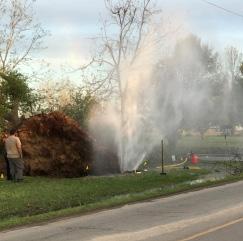LESSONS LEARNED: 2020’s Hindsight Elizabeth Grove, MRWA Management Circuit Rider The recent COVID-19 outbreak and subsequent emergency declaration by Governor Parsons brought forth a number of issues that utility systems were having to deal with as restrictions on movement, operations, and interacting with customers were put in place.
All these questions require policy making at the board level. The recent COVID-19 emergency has brought these issues to the forefront and boards need to plan for future incidences based on lessons learned.
Besides the operational issues of keeping the staff working safely, insuring that staff were properly protected during interactions with customers and other staff, and planning for the potential of staff contracting the virus and being unable to work, other managerial/governing issues arose that many systems were not prepared to address. Add to this trying to keep up with the actions of the federal government in terms of paid time off for employees, funding through stimulus packages for local governments/employers, etc., there was a lot going on that was, at times, overwhelming.
In the instance where the board is not able to meet due to emergency situations, is there authority granted to the board president and/or the system management to address issues that must be addressed? For example, routine expenses such as utilities, payroll, etc., must be paid each month. Does the mayor, board president, or system manager have the authority to pay these routine expenses without board approval during an emergency? A policy should be developed to address these situations. When is it permitted, how will it be monitored, and how will it be reported? The last thing you want is for the electricity to be shut off for non-payment during a crisis!
This article will focus on those issues that impacted the board and policies of the system. Some questions I received during this time included: • “How do we conduct a board meeting if we are restricted from meeting in groups?” • “How do we pay bills if we are not allowed to have a board meeting?” • “Are we prohibited from disconnecting a customer for non-payment during the declared state of emergency?”
Another frequent question I received was “Can we disconnect a customer’s water service for non-payment?” The answer is yes, you can. The declared COVID-19 emergency did not require that utilities be kept on for all customers. However, many utilities adopted a “no-disconnect” policy during the emergency as many customers experienced job loss and thus, loss of income during this time. When asked this question, my response was always “What is the board’s policy on this?” The response I received was “We don’t have a policy.” Again, the board should develop a policy on whether an emergency no-disconnect policy is needed, under what circumstances it should be applied, and who has the authority to invoke and implement it. The same is true for a “no late fees assessed” policy. Does the system have a policy on when to cease assessing late fees, who has the authority to invoke the policy, and what reporting requirements will the board require? Perhaps the biggest concern of systems was how to conduct a board meeting when social distancing and
40









